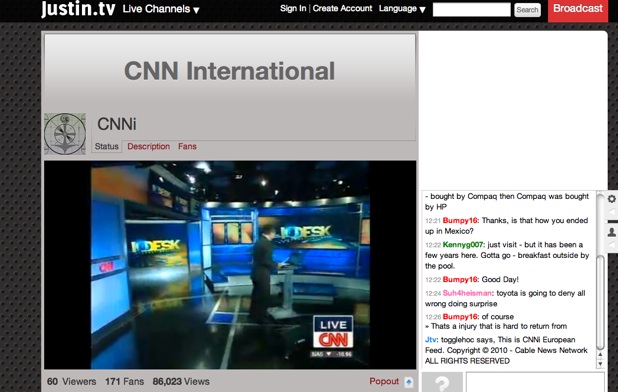
Before livestreaming video networks like Justin.TV can become attractive to advertisers, they need to deal with their piracy issues. It’s the same thing YouTube had to go through, except with live video streams. Like YouTube, Justin.tv complies with DMCA takedown notices and is developing digital fingerprinting technology to identify copyrighted video on its network automatically. It also invites copyright owners to police the site directly.
Despite these measures, a casual perusal of the most popular streams on Justin.tv is filled with pirated streams of professional sports, TV shows, and movies. Right now, for instance, you can watch King of Queens or CNN International, taken straight from TV. The company finds itself increasingly under fire for copyright issues. To help it deal with these issues, Justin.tv now has a new adviser, Eric Goldman, the director of the High Tech Law Institute at Santa Clare University and a highly-respected Internet law blogger. Unlike Justin.TV’s very-expensive lawyers at Wilson Sonsini, Goldman will be less constrained in speaking publicly on behalf of the company about these issues.
Goldman is an expert on how copyright law is applied to user-generated content. But in many ways live video on the Web is a new beast. It is hard for even a vigilant copyright holder to deliver a takedown notice if the video is only live on the Web for an hour. Competitor Livestream takes a “Zero Tolerance Policy” on piracy and challenges its competitors to do the same. Livestream does pretty much the same things Justin.tv does to fight piracy, with one major exception: it limits new channels to 50 concurrent viewers until the channel is authorized manually as a legitimate channel. Should Justin.tv do the same thing? Goldman dismisses Livestream’s zero tolerance policy as somewhat of a marketing pitch, but he thinks the concept of limiting a user’s “ability to put up content until they are proven trustworthy” is worth exploring.
CEO Michael Seibel notes that Livestream can do that because it is pursuing more of an enterprise strategy than a consumer-driven one. He also notes: “We work with the copyright owners. If copyright owners were not happy with us, they would be suing our pants off.” So far, Justin.TV has not been sued in the U.S., while competitor Ustream cannot say the same. Seibel sounds sincere when he tells me, “I don’t want that content on my site.” He really believes he can make money off the pure user-generated video, which costs him one third of a penny for every hour streamed, versus the half-a-penny per hour he can make just on remnant ads.
But if Justin.tv is really serious about cleaning up the pirated streams on it network, why not simply police itself and strip the most questionable content from at least the most popular channels to start? In the bizarro world of created by the DMCA, legally it can’t. Under the DMCA, the responsibility for finding copyright violations lies with the copyright holders. The second that a site starts to take on that responsibility itself, it risks losing the protection of the DMCA’s “safe harbor” provision. So Justin.TV can give copyright holders the tools to remove content from the site, but can’t do it themselves.